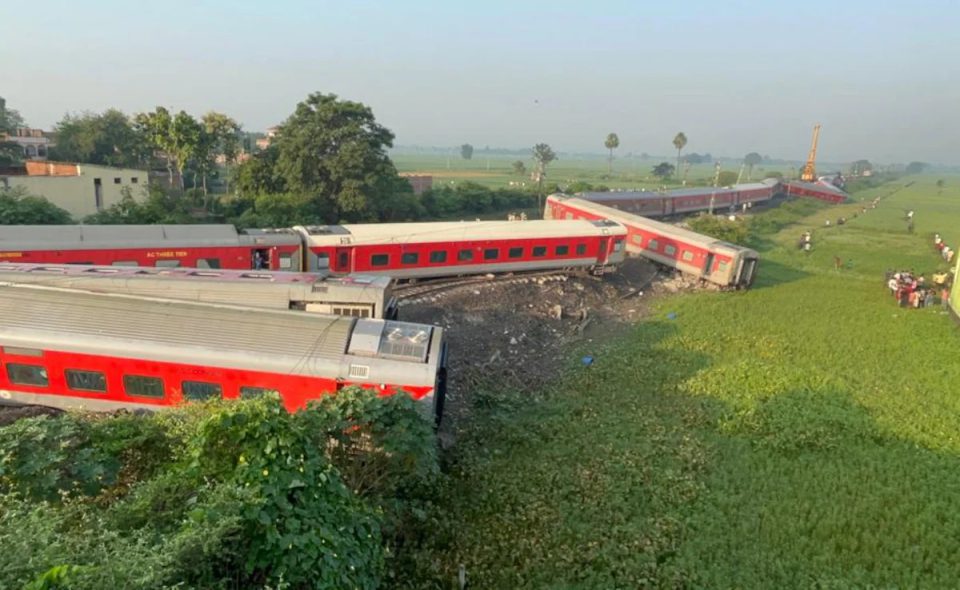In recent months, India’s extensive railway network has been ruined by a series of tragic train accidents, raising serious concerns about rail safety in the country. The latest and most devastating incident occurred on October 29, 2023, in Andhra Pradesh, when a collision took place between the Visakhapatnam-Palasa passenger train and the Visakhapatnam-Rayagada passenger train. This collision resulted in the loss of 14 lives, leaving a path of destruction in its wake. The accident was attributed to one of the trains overshooting a signal, emphasizing the urgent need for modernizing signaling systems and enhancing vigilance among railway personnel to prevent such tragedies.
Before this tragic incident, a series of other train accidents had already taken place in India in 2023.
The year began with a derailment on January 2, as 11 coaches of the Suryanagri Express derailed shortly after leaving Marwar Junction, injuring ten people. On April 3, a horrifying incident occurred in Kozhikode, Kerala, when a passenger, Mohammad Shahrukh Saifi, set fellow passengers on fire aboard an express train bound for Kannur. This act of fire-raising left eight passengers with burn injuries, and tragically, three individuals, including a two-year-old girl, were found dead on a railway track.
Fortunately, not all incidents resulted in casualties. On May 15, a coach of the Chennai-Bangalore Double Decker Express derailed near Bisanattam station, but no injuries were reported. However, on June 2, a tragedy train collision took place in Odisha. Train 12841 Coromandel Express collided with a freight train loaded with iron ore, resulting in over 20 derailed coaches and a devastating toll of more than 1,200 injuries and 296 fatalities. This incident involved three trains, as the SMVT Bengaluru-Howrah SF Express narrowly escaped a collision.
In the months that followed, various derailments occurred. On June 8, the last coach of the Nilgiri Mountain Railway derailed near Coonoor station, fortunately without injuries or casualties. On June 9, a coach of the Vijayawada-Chennai Central Jan Shatabdi Express derailed near Basin Bridge station without causing harm. The same month, on June 11, the last coach of a Chennai suburban local train derailed near Basin Bridge station, again with no reported injuries.
In late June, a coach of the Lokmanya Tilak Express caught fire near Vyasarpadi station due to a high-voltage power line friction, but there were no injuries or casualties. Then, on June 25, a collision occurred between two goods trains at Ondagram station in West Bengal, with both the LP and ALP being accused of breaking signals.
The month of July brought another fire incident, as three coaches of the Falaknuma Express to Howrah caught fire between Bommaipally and Pagidipally. The cause remained unknown, but fortunately, no casualties or injuries were reported.
On August 26, a fire erupted in the Lucknow-Rameshwaram Bharat Gaurav train stationed near Madurai Junction, resulting in nine deaths and 20 injuries. Initial inquiries indicate that passengers had managed to bring a gas cylinder onto the train and were preparing food inside the coach when the fire started.
September saw a fire in the EOG and B1 coach of the Tiruchirapalli-Shri Ganganagar Humsafar SF Express while crossing Valsad Railway Station. Lastly, on September 26, an EMU train originating from Shakur Basti in Mathura derailed and climbed onto platform number 2A at the station.
Tragedy continued in October too, with a derailment on October 11 where six coaches of the Anand Vihar Terminal-Kamakhya Junction North East Express derailed in Bihar’s Buxar district, resulting in four deaths and over 70 injuries. The year culminated with a devastating train collision on October 29, when the Visakhapatnam-Rayagada passenger train collided with the Visakhapatnam-Palasa passenger train in Andhra Pradesh, leading to 14 fatalities and 50 injuries.
These incidents collectively underscore the critical need for enhanced safety measures and modernization of signaling systems in India’s railway network to prevent such tragic accidents and ensure the safety of passengers in the future.

